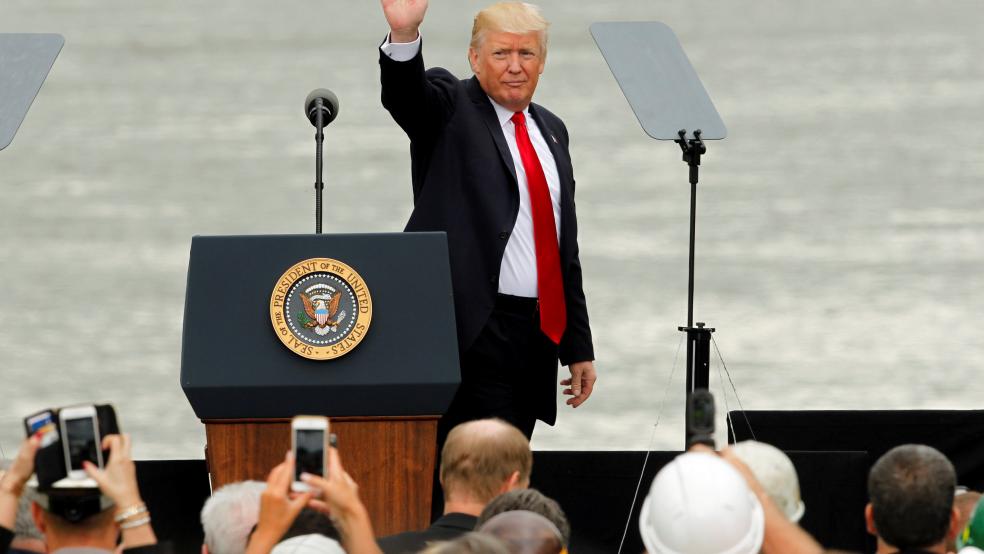During meetings with Republican lawmakers on Capitol Hill on Wednesday, Vice President-elect Mike Pence offered a preview of President-elect Donald Trump’s inaugural address later this month.
There will be plenty of talk, Pence suggested, about repealing and replacing Obamacare and toughening immigration policies. Trump will promote his $1 trillion plan for new infrastructure, as well as trillions more in major tax cuts and beefing up the military.
Related: The GOP May Get a Taste of Its Own Medicine on Supreme Court Nominations
But Trump frequently said on the campaign trail that his three-part agenda could best be summed up as “Jobs, jobs jobs.”
And a new survey by Morning Consult and Politico released yesterday suggests that on the issue of jobs and economic growth, Trump and the public are very much in sync. Asked what they want Trump to focus on most when he delivers his inaugural address on January 20, 75 percent of American voters said keeping manufacturing jobs in the U.S. and bringing jobs back from overseas.
What’s more, 52 percent said they want to hear the new president discuss his threats of slapping tariffs on imported goods made in China and Mexico.
While many voters are eager for him to speak out on issues that dominated the campaign, including immigration reform, building a wall along the southern border and temporarily banning Muslims from entering the country, the nation also yearns to hear conciliatory rhetoric from the new 45th president of the United States.
Related: Senate Dems Plan to Slam the Brakes on Trump’s Cabinet
Seventy-four percent of the 2,000 voters surveyed December 28 and 29 said they want to hear from Trump on the importance of healing the country after one of the dirtiest and most divisive presidential campaigns of modern times. A sizeable majority (62 percent) also said it was important for Trump to talk about his plans for selecting a new Supreme Court justice to succeed the late conservative jurist Antonin Scalia.
Voters are also interested in hearing from Trump on several issues that he may not want to talk about.
Those include the real estate mogul’s efforts to separate himself from his family business interests to avoid a conflict of interest, and revelations of Russian hacking of the Democratic National Committee and Hillary Clinton’s campaign, which Trump has repeatedly scoffed at. Fifty-three percent would like to hear about the hacking and 61 percent are keenly interested in the billionaire’s potential conflicts of interest.
But those voters interviewed were most interested in jobs, and presumably what Trump has in mind to fulfill his promises.
Since winning the election November 8, Trump has focused on preserving or bolstering manufacturing jobs in the U.S. Through a series of tweets and off-handed comments, Trump has aggressively jawboned the auto industry and other manufacturers into keeping some jobs in this country or bringing them back from Mexico and overseas.
Related: Why Trump Needs to Take the Economy More Seriously
Those efforts ranged from persuading an Indiana air conditioning and heating manufacturer to keep 800 jobs in the state that were slated for transfer to Mexico to badgering Ford Motor Co. to jettison plans this week to build a $1.6 billion small-car factory in Mexico.
Trump is spoiling for more run-ins with U.S. corporations that operate overseas and import their products back here, or that are considering plans to move more jobs overseas. And he is promising hard-edged bargaining with China, Mexico and other trading partners to lower overseas obstacles to U.S. products by threatening retaliatory import duties and tariffs.
Trump’s choice of attorney Robert Lighthizer as the U.S. Trade Representative, billionaire businessman Wilbur Ross as Commerce Secretary and economist Peter Navarro as the head of a new government trade council, will bring together three veteran trade experts who share Trump’s determination to shake up the international trade scene to the advantage of the U.S.
House Republicans have drafted a border tax plan to discourage imports, according to The Wall Street Journal. Trump and his advisers have proposed a tax or tariff of 35 percent on goods produced by companies that shift production crews overseas.





